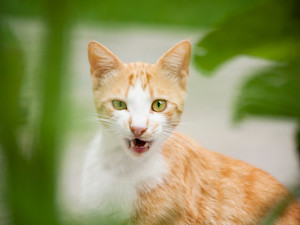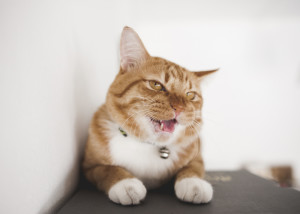Why Do Cats Chirp When They See Birds Outside?
And what you should do about it.

Share Article
In This Article:
What Is Chirping? Is It Normal For Cats to Chirp At Birds? Why Do Cats Chirp At Birds? Do Cats Chirp At Anything Other Than Birds? How Should You Respond to Your Cat Chirping At Birds? Misconceptions About Cat Chirping Frequently Asked Questions
Have you ever noticed your cat perched at the window, tail twitching, eyes wide, and making the oddest sound — somewhere between a squeak, trill, and stifled cough? That adorable and bizarre noise is called chirping, and it’s an endearing mystery of feline behavior.
But what’s happening in your cat’s mind when they chirp at birds outside? Are they trying to communicate? Practicing weird hunting sounds? Or are they frustrated that their feathered foe is out of their paws’ reach?
Chirping is a complex vocalization that speaks volumes about a cat’s instincts, emotions, and relationship with their pet parents. While it may sound cute, chirping is rooted in primal instincts. It’s not just a quirky trait; it’s nature meeting nurture, instinct meeting window glass.

What is chirping?
Chirping is a vocalization between a bird call and a half-purr. It’s sharp, quick, and accompanied by jaw movements or soft teeth chattering. It’s different from meowing or purring in that it’s usually directed at a source, like a bird, bug, or favorite toy.
What does cat chirping sound like?
Imagine a mix of a squirrel squeak and a rapid-fire tweet. It can sound like “eh-eh-eh” or “chrrrp,” and it often escapes in bursts. Your cat is expressing more than a desire to chat. Some pet parents compare it to their cat trying to “speak bird,” but it’s more about longing than language.
Chirping and cat body language
When a cat chirps, they usually pair it with hyper-focused eyes, a low crouching posture, and a rapidly twitching tail. Their body is tensed, as though ready to pounce if not for the annoying glass pane in the way. The tail twitch is a sign of bottled feline frustration.
Is it normal for cats to chirp at birds?
Yes! If your cat chirps at birds, bugs, or even dust particles in a sunbeam, they are highly engaged, healthy, and communicative. Chirping is a typical expression of hunting instincts and curiosity. In multi-cat households, chirping can become a shared activity, like neighbors gossiping about backyard drama.
Why do cats chirp at birds?
There are a few reasons cats chirp at birds, including the following:
Hunting instincts
Cats are predators, whether lounging on your velvet chaise or stalking pigeons from the windowsill. The chirping sound mimics bird calls or the cries of prey. Some experts believe chirping is mimicry, an instinctual strategy to lure unsuspecting birds. While your indoor cat won’t be hunting real prey (beyond the occasional spider), their brain still runs on the same hunting software as their big cat cousins.
Frustration
That window is a wall of frustration. According to Marilyn Krieger, a certified cat behaviorist in San Francisco, when cats are separated by a barrier (like a window), their chattering indicates irritation at being unable to reach the prey. Cats chirp because they want the bird — they see it but can’t get it.
Disconnection between the urge to pounce and the inability to act creates frustration. Chirping can be a vocal outlet for energy, like a human muttering under their breath when upset.
Excitement
Cats get excited. A fluttering bird or buzzing insect triggers a dopamine surge. Think of it as the feline behavior equivalent of clapping their paws in glee.
Do cats chirp at anything other than birds?
While birds are the top chirp-inducers, cats also chirp at insects, squirrels, and even shadows on a wall. Some cats chirp at toys, especially ones that mimic prey behavior, like feather wands and motorized mice. Some cats chirp at their pet parents, which can signify affection and a demand for attention.
How should you respond to your cat chirping at birds?
Don’t worry, chirping is healthy and normal. It means your cat is mentally stimulated and engaged and likely having a great time stalking their “prey” from the safety and comfort of home.
You can encourage this behavior by placing a bird feeder near the window or offering interactive, prey-like toys. However, remember your cat still needs downtime, so close a curtain or put away toys to avoid overstimulation. If chirping turns into constant agitation or yowling, your cat needs more enrichment. Puzzle feeders, vertical spaces, and interactive play sessions can help balance their energy.
Misconceptions about cat chirping
Some pet parents worry that chirping is a sign of distress or a medical issue. In most cases, it’s not. The sound is a non-aggressive vocalization. It’s not about fear or confrontation; it’s about engagement.
Also, chirping doesn’t mean your cat is sad that they can’t catch the bird. Think of it as more emotional multitasking: “I want it, I can’t have it, I’m still hopeful.”
Bottom line: why your cat chirps at birds
Your cat chirps at birds because they’re wired to hunt, fascinated by movement, and emotionally invested in the tiny dramas of the natural world. Chirping is a charming side effect of those feline instincts and emotions bubbling up and spilling over. Whether a bird, bug, or something else caught their attention, your cat’s chirps tell you they’re aware, alert, and still a little predator.
FAQs
Why do cats chatter their teeth when they see a bird?
The chattering, often paired with chirping, is a physical reaction to excitement and frustration.
What does it mean when a cat chatters?
Chattering is your cat’s way of expressing internal conflict: the desire to hunt versus the inability to act.
What’s it called when cats chatter at birds?
It’s often called chirping, chattering, or twittering. Behaviorists use these terms interchangeably to describe cats' rapid vocalization when observing prey.
Why do cats make weird noises at flies?
Flies trigger the same prey drive as birds. They buzz, flit, and keep out of reach. Naturally, your cat responds with the same combination of chirps, chatters, twitches, and wiggles.
References
Krieger, Marilyn. The Cat Coach. The Cat Coach, LLC, www.thecatcoach.com/opens in new tab
"Unveiling the Mystery: Why Do Cats Chirp at Birds?" The Cat Bandit Blog, https://blog.catbandit.com/unveiling-the-mystery-why-do-cats-chirp-at-birds/opens in new tab
"Why Do Cats Chirp at Birds? Understanding Your Feline’s Behavior." Fluffy Tamer, 8 Dec. 2023, https://fluffytamer.com/cat-chirping-birds-why/opens in new tab

Valerie Mellema
Valerie Mellema has a Bachelor of Science in Agribusiness and Equine Industry from West Texas A&M University. She has been a professional writer for the past 20 years, covering a wide variety of pet health and care topics before founding a nonprofit focused on mental health in children and thoroughbred aftercare. She has four Border Collies and eight retired racehorses.
Related articles
The Meaning Behind the Meow: Cat Language Decoded
Understand your cat’s chatter.
Why Does My Cat Meow at Night? (And How to Prevent It)
Just a small request to lower the volume, please.
![cat staring at person on table]()
Why Does My Cat Stare at Me?
...Is it something you said?
Do You Have a Quiet Kitty? Why Some Cats Don’t Meow
You love that your cat is quiet, but sometimes too quiet can be concerning.
![a cat making a strange face with its mouth open.]()
Is Your Cat Judging You?
That disapproving sneer is actually the “Flehmen response.” A cat behaviorist explains how to read cats’ lips.
Can Cats Actually Copy Human Speech? Viral Videos Say So
It seems like some cats know how to say “hello.”







